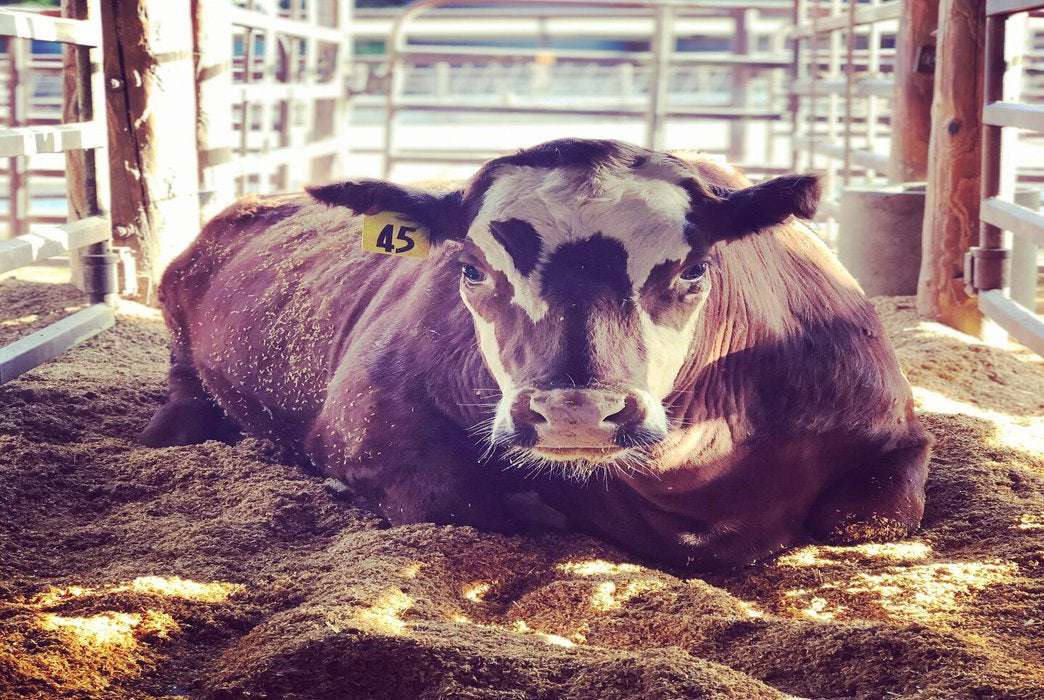Feeding seaweed to cattle dramatically and persistently reduces the amount of methane the animals emit, indicating that supplementing their diets with small amounts of the algae could cut down on the livestock industry’s carbon footprint, scientists reported this week.
When the researchers fed beef steers varying amounts of red seaweed and tracked them over 21 weeks, they found that methane emissions dropped by up to 80%. The team published the findings March 17 in the journal PLOS ONE.
“Seeing the drastic reductions in methane were really surprising,” said Breanna Roque, a doctoral student in animal biology at the University of California, Davis and first author of the paper.
Globally, food production accounts for an estimated one-third of greenhouse gas emissions. Livestock alone are responsible for roughly 14.5% of emissions, the majority of which is methane gas.
This methane arises in the stomachs of cows and their ruminant relatives before being belched out into the air. During fermentation, microbes dwelling in the animals’ stomachs break down plant material and release hydrogen and carbon dioxide, says Ermias Kebreab, a professor of animal science at UC Davis and last author of the paper. Other microbes use the hydrogen as an energy source and produce methane as a byproduct.
Some seaweeds contain a compound called bromoform that interrupts this process. In recent years, scientists have begun to investigate how feeding seaweeds to cattle can reduce the amount of methane the animals belch over short periods of time. Particularly promising is the red seaweed Asparagopsis taxiformis, which has unusually high amounts of bromoform in its cells.
However, researchers have worried that the microbial community in the ruminants’ stomachs might eventually adapt to the presence of the bromoform, blunting its effectiveness, Kebreab says. He and his colleagues wanted to find out whether the strategy would continue to work over the span of months.
The researchers tracked 20 steers over 147 days and measured the amounts of methane gas they produced. Some of the steers were fed a normal diet for the sake of comparison, while others were given seaweed supplements of approximately 50 or 90 grams per day.
The amount of methane the steers belched out was tied to both the amount of seaweed they received and the amount of fiber in their diets, which varied over the 21-week period. When the steers were eating more fiber, the seaweed was relatively less effective at reducing methane emissions. Overall, the steers that received the lower and higher amounts of seaweed slashed their methane emissions by 45% and 68%, respectively. When steers were eating a low-fiber, seaweed-supplemented diet, their methane emissions were reduced by about 70% to 80%.
“The seaweed was effective throughout the whole 21-week period,” Kebreab said. “We didn’t see any indication of [microbial] adaptation.”
After the steers were eventually slaughtered, the researchers found no measurable trace of bromoform in the meat. “And then in terms of quality and taste and texture, juiciness and all that, there was no difference between meat that was prepared from animals fed seaweed and those who were not,” Kebreab said.
As an added bonus, the seaweed supplements also caused the animals to gain weight more efficiently, mainly because they had access to carbon that would otherwise have been lost to methane production. This could make the seaweed more affordable for farmers to use, says Kebreab.
Another advantage of Asparagopsis is that it has been found growing naturally all around the world.
“So in terms of scalability, it actually looks fairly promising to be able to grow this seaweed in different temperatures and climate,” Roque said.
Still, there are challenges to using the seaweed supplements on a large scale, such as the fact that feed additives are regulated as drugs by the U.S. Food and Drug Administration, says Kebreab. Additionally, the cattle seem not to like the seaweed when they can detect its presence.
“We have to make sure that we have that balance where animals don't even know that it's there,” he said.
The study, “Red seaweed (Asparagopsis taxiformis) supplementation reduces enteric methane by over 80 percent in beef steers,” published March 17 in PLOS ONE, was authored by Breanna M. Roque, Marielena Venegas, Toni L. Duarte, Xiang Yang and Ermias Kebreab, University of California, Davis; Robert D. Kinley, Commonwealth Scientific and Industrial Research Organisation, Agriculture and Food; and Rocky de Nys, James Cook University.

damontoo on March 18th, 2021 at 00:16 UTC »
Don't be fooled into thinking this solves cattle impact on the environment. They still have a very large land and water requirement. Meat alternatives like beyond and impossible reduce the carbon footprint by 90% and land and fresh water consumption by 90%+.
sids99 on March 17th, 2021 at 20:46 UTC »
Aren't cows fed corn which they're not adapted to eating? I've read this causes them to have all sorts of gastrointestinal issues.
Absurdionne on March 17th, 2021 at 19:31 UTC »
I've been hearing about this for at least 10 years. Is it actually happening?